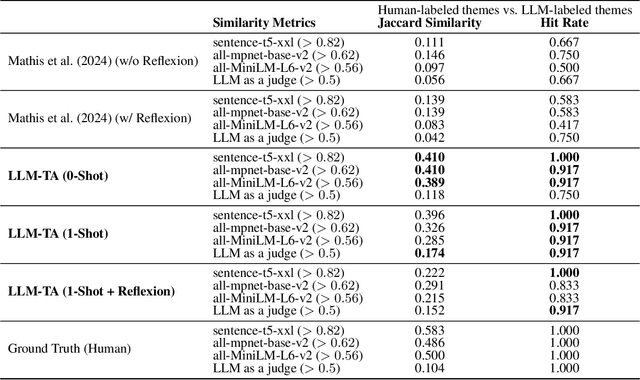Lily Boddy
GuideLLM: Exploring LLM-Guided Conversation with Applications in Autobiography Interviewing
Feb 10, 2025



Abstract:Although Large Language Models (LLMs) succeed in human-guided conversations such as instruction following and question answering, the potential of LLM-guided conversations-where LLMs direct the discourse and steer the conversation's objectives-remains under-explored. In this study, we first characterize LLM-guided conversation into three fundamental components: (i) Goal Navigation; (ii) Context Management; (iii) Empathetic Engagement, and propose GuideLLM as an installation. We then implement an interviewing environment for the evaluation of LLM-guided conversation. Specifically, various topics are involved in this environment for comprehensive interviewing evaluation, resulting in around 1.4k turns of utterances, 184k tokens, and over 200 events mentioned during the interviewing for each chatbot evaluation. We compare GuideLLM with 6 state-of-the-art LLMs such as GPT-4o and Llama-3-70b-Instruct, from the perspective of interviewing quality, and autobiography generation quality. For automatic evaluation, we derive user proxies from multiple autobiographies and employ LLM-as-a-judge to score LLM behaviors. We further conduct a human-involved experiment by employing 45 human participants to chat with GuideLLM and baselines. We then collect human feedback, preferences, and ratings regarding the qualities of conversation and autobiography. Experimental results indicate that GuideLLM significantly outperforms baseline LLMs in automatic evaluation and achieves consistent leading performances in human ratings.
LLM-TA: An LLM-Enhanced Thematic Analysis Pipeline for Transcripts from Parents of Children with Congenital Heart Disease
Feb 03, 2025



Abstract:Thematic Analysis (TA) is a fundamental method in healthcare research for analyzing transcript data, but it is resource-intensive and difficult to scale for large, complex datasets. This study investigates the potential of large language models (LLMs) to augment the inductive TA process in high-stakes healthcare settings. Focusing on interview transcripts from parents of children with Anomalous Aortic Origin of a Coronary Artery (AAOCA), a rare congenital heart disease, we propose an LLM-Enhanced Thematic Analysis (LLM-TA) pipeline. Our pipeline integrates an affordable state-of-the-art LLM (GPT-4o mini), LangChain, and prompt engineering with chunking techniques to analyze nine detailed transcripts following the inductive TA framework. We evaluate the LLM-generated themes against human-generated results using thematic similarity metrics, LLM-assisted assessments, and expert reviews. Results demonstrate that our pipeline outperforms existing LLM-assisted TA methods significantly. While the pipeline alone has not yet reached human-level quality in inductive TA, it shows great potential to improve scalability, efficiency, and accuracy while reducing analyst workload when working collaboratively with domain experts. We provide practical recommendations for incorporating LLMs into high-stakes TA workflows and emphasize the importance of close collaboration with domain experts to address challenges related to real-world applicability and dataset complexity. https://github.com/jiaweixu98/LLM-TA
 Add to Chrome
Add to Chrome Add to Firefox
Add to Firefox Add to Edge
Add to Edge